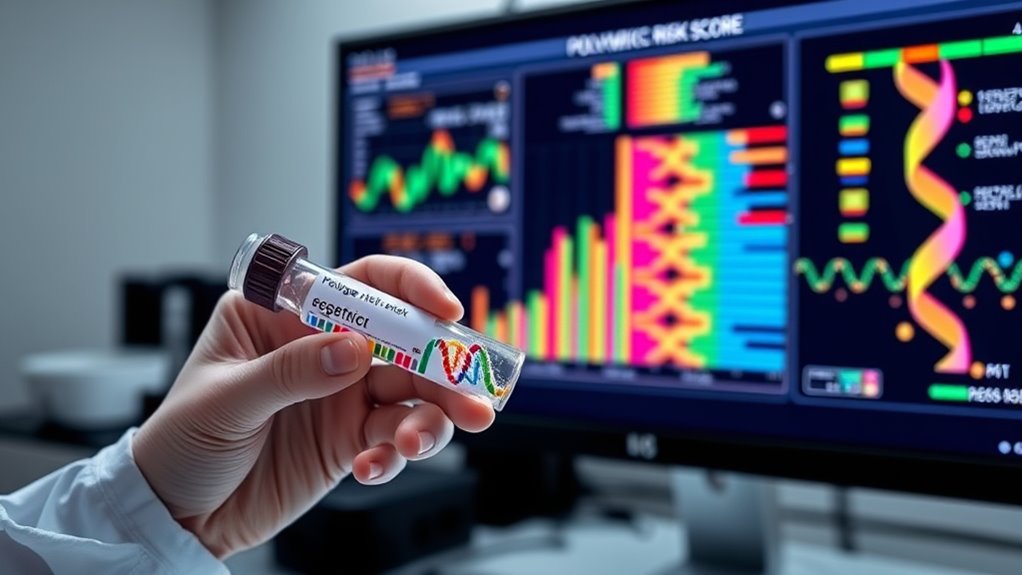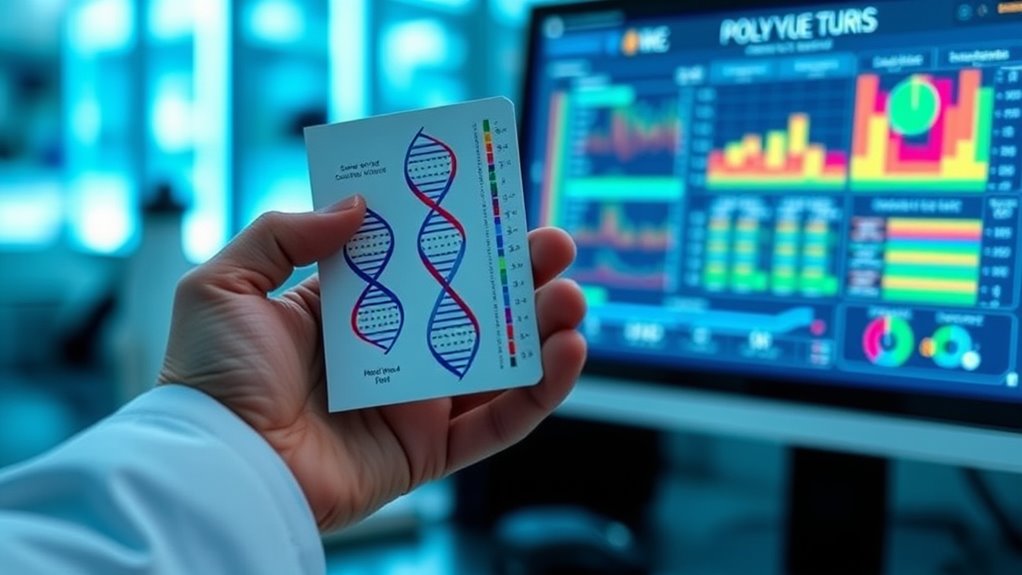Cancer risk scores from polygenic testing assess your inherited genetic makeup by analyzing multiple genetic variants linked to cancer risk. These scores combine data on genes that influence cell growth, repair, and hormone levels, giving you a personalized estimate of your predisposition. While they help guide screening and prevention, they don’t predict cancer with certainty and should be used alongside other health factors. Explore further to understand how your results can best support your health decisions.
Key Takeaways
- Polygenic testing analyzes multiple genetic variants to estimate an individual’s inherited cancer risk beyond single-gene mutations.
- These scores combine genetic data with personal and family history to guide screening and prevention strategies.
- Higher polygenic risk scores suggest increased genetic predisposition, but environmental factors also influence overall risk.
- Results are estimates, not definitive predictions, and should be integrated with lifestyle, environmental, and medical information.
- Ethical considerations include data privacy, informed consent, and secure handling of sensitive genetic information.
What Are Cancer Risk Scores?

Have you ever wondered how doctors estimate your chances of developing cancer? Cancer risk scores are tools that help do just that. They analyze your personal health data, family history, lifestyle choices, and sometimes genetic information to provide an overall risk estimate. These scores combine multiple factors into a single number or category, indicating whether you’re at low, moderate, or high risk. They don’t predict cancer with certainty but offer valuable insights for proactive health decisions. By understanding your risk score, you and your healthcare provider can decide on screening strategies or lifestyle changes to lower your chances. Basically, these scores serve as a personalized roadmap, guiding you toward better health management and early detection.
The Role of Genetics in Cancer Risk Assessment

Genetics play a crucial role in determining your cancer risk because inherited gene mutations can notably increase the likelihood of developing certain cancers. These mutations are passed down through families and can considerably raise your susceptibility. For example, mutations in genes like BRCA1 and BRCA2 are linked to higher risks of breast and ovarian cancers. Your genetic makeup provides clues about your vulnerability, helping healthcare providers assess your risk more accurately. While lifestyle and environment matter, genetics can reveal underlying predispositions that might not be obvious. Understanding your genetic factors enables early detection and tailored prevention strategies. Genetic testing can identify these inherited mutations, offering valuable insights for proactive health management. By identifying inherited risks, you can make informed decisions about screening and lifestyle changes to reduce your overall cancer risk.
How Polygenic Testing Works

Polygenic testing evaluates your risk for cancer by analyzing multiple genetic variants, rather than focusing on single gene mutations. It involves collecting a sample of your DNA, usually through a blood or saliva test, which is then sent to a lab. There, advanced algorithms examine thousands of genetic markers associated with cancer risk. Each variant contributes a small amount to your overall risk, and the test combines these data points to generate a risk score. This score helps predict your likelihood of developing certain cancers based on your unique genetic makeup. Unlike single-gene tests, polygenic testing provides a broader view of your inherited risk, capturing the complex interplay of many genes that influence cancer development. It’s a powerful tool for personalized risk assessment. Incorporating top genetic markers enhances the accuracy and comprehensiveness of the risk evaluation.
Key Genetic Variants and Their Impact

Certain genetic variants play a significant role in determining your cancer risk by influencing how cells grow, divide, and repair themselves. These variants, often found in specific genes, can increase susceptibility to certain types of cancer. For example, mutations in tumor suppressor genes impair cell cycle regulation, leading to uncontrolled growth. Variants in DNA repair genes can reduce the body’s ability to fix genetic damage, raising cancer chances. Additionally, some variants affect hormone levels or immune responses, impacting cancer development. Understanding these key variants helps identify your risk factors more accurately. Brewing methods can influence the detection of genetic mutations related to cancer susceptibility.
Interpreting Polygenic Risk Scores

Interpreting polygenic risk scores involves understanding how multiple genetic variants collectively influence your likelihood of developing cancer. These scores combine information from many genetic markers to estimate your overall genetic predisposition. A higher score suggests a greater inherited risk, while a lower score indicates a reduced risk. However, your score doesn’t determine your fate; it’s one piece of the puzzle. It’s important to take into account that environmental factors and lifestyle choices also play critical roles in cancer development. When reviewing your score, ask your healthcare provider what it means for your personal health and what next steps you should take. Remember, a polygenic risk score is a tool to inform, not predict, your future health outcomes. Quotes about guidance and support can offer valuable insights into managing your health proactively.
Benefits and Limitations of Polygenic Testing

Polygenic testing can improve your ability to predict cancer risk by considering multiple genetic factors. However, it also raises concerns about your genetic privacy and how your data is protected. Additionally, the tests have limitations, such as not capturing all risk factors or being fully accurate for everyone. For example, vetted products ensure safety and effectiveness in various applications.
Enhanced Risk Prediction
Enhanced risk prediction through polygenic testing offers a promising way to identify individuals at higher genetic risk for cancer, potentially enabling earlier interventions and personalized screening strategies. By analyzing multiple genetic variants, you can better estimate your lifetime risk and tailor prevention plans accordingly. However, the accuracy of these predictions depends on the quality of genetic data and the population studied. Limitations include the current inability to fully account for environmental and lifestyle factors, which also influence risk. Additionally, polygenic scores may not be equally predictive across diverse ethnic groups, potentially leading to disparities. As research advances, these tools will improve, but they should complement, not replace, traditional screening and risk assessment methods. Understanding genetic diversity is essential for improving the predictive accuracy of these scores across different populations.
- Incorporation of lifestyle factors for all-encompassing risk assessment
- Variability in predictive accuracy across different populations
- Impact of genetic diversity on score reliability
- Potential for over- or underestimating risk based on current models
Genetic Privacy Concerns
While polygenic testing offers significant benefits for personalized cancer risk assessment, it also raises important privacy concerns. Your genetic information is highly sensitive and uniquely identifiable, making it vulnerable to misuse if not properly protected. There’s a risk that data could be accessed by unauthorized parties, leading to potential discrimination by employers or insurers. Despite regulations like GINA, gaps remain that might allow your genetic details to be exploited. You may also worry about how your data is stored, shared, or sold without your explicit consent. Protecting your genetic privacy requires understanding the policies of testing companies and being cautious about sharing your results. Implementing security measures can help safeguard your data from breaches and unauthorized access. Balancing the advantages of personalized risk insights with safeguarding your privacy is vital in the evolving landscape of polygenic testing.
Testing Limitations
Although polygenic testing can offer valuable insights into your cancer risk, it’s important to recognize its limitations. These tests don’t provide definitive predictions, only estimates based on current knowledge. They may overlook rare genetic factors or interactions that influence risk. Additionally, results can vary depending on the population studied and the specific panel used. Environmental and lifestyle factors also play a significant role, which these tests don’t account for. You should view polygenic scores as one piece of your overall health picture, not a certainty. Sound healing science research indicates that environmental influences can impact health outcomes beyond genetic predispositions.
- Limited accuracy for individual predictions
- May not include all relevant genetic variants
- Results can be influenced by population bias
- Cannot replace traditional screening or medical advice
Integrating Risk Scores Into Medical Care

Integrating risk scores into medical care offers a practical way to personalize treatment and improve outcomes. When your healthcare provider uses your cancer risk score, they can tailor screening schedules, recommend preventive measures, or consider early interventions. This targeted approach helps catch potential issues sooner and reduces unnecessary procedures for those at lower risk. By combining polygenic risk scores with your personal and family history, doctors can develop a more accurate picture of your overall risk. Implementing these scores requires careful coordination, clear communication, and updated guidelines to ensure they’re used effectively. Additionally, understanding how entertainment and parks operate can be useful when planning family visits that promote health and well-being. Ultimately, integrating risk scores into routine care empowers you with more precise information, enabling proactive decisions that could considerably impact your health and cancer prevention strategies.
Ethical Considerations and Privacy Concerns

As you use cancer risk scores, you need to consider the challenges of keeping patient data secure from breaches and unauthorized access. You also have to ensure that patients truly understand how their information will be used and give their informed consent. Addressing these ethical issues is vital to maintaining trust and protecting patient privacy. Being aware of Vetted information ensures that all practices adhere to established standards of confidentiality and ethical responsibility.
Data Security Challenges
Data security challenges in cancer risk scoring systems raise significant ethical and privacy concerns that can’t be overlooked. Your personal genetic data is highly sensitive, and breaches can lead to identity theft, discrimination, or misuse. Ensuring robust security measures is essential to protect this information from unauthorized access. You should be aware of potential vulnerabilities, such as hacking, data leaks, or weak encryption. Additionally, maintaining compliance with regulations like HIPAA or GDPR is vital to prevent legal consequences. The complexity of data storage, transfer, and sharing increases the risk of exposure. To safeguard your information, organizations must implement strict security protocols, conduct regular audits, and prioritize transparency about data handling practices.
- Encryption and data anonymization techniques
- Secure data storage and transfer protocols
- Access controls and user authentication
- Regular security audits and updates
Informed Consent Dynamics
Informed consent is a critical component of ethical practice in cancer risk scoring systems, ensuring that you understand how your personal data will be used, stored, and shared. Without clear consent, you risk privacy breaches and misuse of your genetic information. It’s essential that you’re fully aware of what you’re agreeing to before undergoing testing. Transparency about data handling builds trust and helps you make informed decisions. Consider the following factors:
| Aspect | Description | Your Responsibility |
|---|---|---|
| Data Usage | How your data will be employed | Ask questions about purpose |
| Privacy Protections | Measures to safeguard your info | Review privacy policies |
| Sharing | Who can access your data | Consent to third parties |
| Storage Duration | How long your data will be retained | Clarify retention policies |
| Revocation | How to withdraw consent | Know your rights |
Future Directions in Genetic Risk Prediction

Advances in genetic research are paving the way for more accurate and personalized risk prediction models. As technology improves, you’ll see better integration of genetic data with other health factors, leading to more precise assessments. Researchers are working on expanding datasets to include diverse populations, reducing biases and increasing applicability. Machine learning algorithms are becoming more sophisticated, capable of identifying complex gene interactions that influence cancer risk. Additionally, efforts are underway to develop dynamic risk models that adapt over time as new data emerges. These innovations aim to enhance early detection, guide tailored prevention strategies, and improve overall outcomes. Staying informed about these developments can help you understand how future tools might better predict your individual cancer risk.
Genetic research advances enable personalized, adaptive cancer risk prediction for better early detection and prevention.
- Integration of multi-omics data for exhaustive risk analysis
- Enhanced algorithms utilizing artificial intelligence and machine learning
- Inclusion of diverse genetic and environmental factors
- Development of real-time, adaptive risk models
How to Use Your Results for Prevention

Understanding your risk scores is a essential step toward taking control of your health. Once you know your genetic risk, you can work with your healthcare provider to develop a personalized prevention plan. This might include lifestyle changes like eating a balanced diet, exercising regularly, and avoiding tobacco and excessive alcohol. Regular screenings are also critical, especially if your risk score indicates a higher likelihood of developing cancer. Be proactive about monitoring your health, and don’t hesitate to ask your doctor about additional tests or preventive measures. Remember, your risk score isn’t a prediction but a tool to guide smarter choices. By acting on this information, you can reduce your overall risk and catch potential issues early.
Frequently Asked Questions
How Accurate Are Current Polygenic Risk Scores for Different Cancer Types?
You’re wondering how accurate current polygenic risk scores are for various cancer types. These scores can provide helpful insights, but their accuracy varies depending on the specific cancer and the genetic data available. Generally, they improve risk prediction compared to traditional factors, but they aren’t perfect. You should remember that these scores are just one piece of your overall risk assessment and should be used alongside other health information.
Can Lifestyle Changes Significantly Modify Genetically Predicted Cancer Risks?
You might wonder if changing your lifestyle can really lower your cancer risk predictions. The truth is, while genetics set a baseline, adopting healthy habits like quitting smoking, maintaining a balanced diet, exercising regularly, and limiting alcohol can markedly reduce your overall risk. These positive changes can sometimes outweigh genetic predispositions, giving you more control over your health. So yes, your actions can make a meaningful difference in your cancer risk.
Are There Specific Populations for Which Polygenic Testing Is Less Effective?
Imagine trying to read a map with missing pieces—that’s what polygenic testing can feel like for some populations. It’s less effective in groups with diverse ancestry because most genetic studies focus on specific populations, like those of European descent. If you belong to an underrepresented group, your genetic risks might not be accurately captured, making the test less reliable. So, it’s like trying to find your way with an incomplete map.
How Do Insurance Companies View Polygenic Testing Results?
Insurance companies often view polygenic testing results as valuable for evaluating your health risks, but they might have concerns about privacy and accuracy. They could use this information to adjust premiums or coverage options. However, laws like GINA aim to protect you from discrimination based on genetic data. You should review your policy details and consult with your insurer to understand how your test results might impact your coverage.
What Are the Psychological Effects of Learning One’s Genetic Cancer Risk?
Imagine learning you have a higher genetic risk for cancer; it can evoke anxiety or fear. You might feel overwhelmed, worry about your future health, or become more vigilant about screenings. Some find it motivating to adopt healthier habits, while others feel helpless. These psychological effects vary, but recognizing your emotional response helps you seek support and manage anxiety effectively, ensuring you stay proactive without feeling overwhelmed.
Conclusion
Understanding your polygenic risk scores empowers you to take control of your health, but it also reminds you of how much remains uncertain. While these scores can guide prevention, they can’t guarantee outcomes. Balancing hope with caution, you have the tools to make informed choices, yet still face the unpredictable nature of cancer. Embrace this knowledge as a step forward, but stay vigilant—your journey is about hope, awareness, and resilience.









